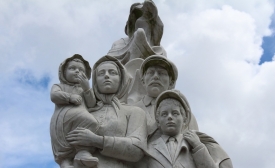human rights watch

Tara Ornstein debunks a few of the myths surrounding migration.
We write on the occasion of the forthcoming 13th Australia-Vietnam human rights dialogue, scheduled to be held in Vietnam in August 2016. Australia should raise pressing human rights issues in an unambiguous manner, set clear benchmarks for improvements, and make the outcome of the discussions public.
Three political parties and two independents running in the Australian federal elections set out their human rights priorities in response to a Human Rights Watch questionnaire, Human Rights Watch said today. The parties gave their positions on a range of domestic and foreign policy human rights issues, including whistleblower protection and offshore asylum policy, in advance of polls on July 2, 2016.
The NGO campaigns, led by Human Rights Watch and Amnesty International, are vital in this process. The problem is that journalists, academics, diplomats, political leaders, and Western officials frequently quote these usually uncorroborated accusations in condemning Israeli policies, “reflecting the ‘soft power’ of these NGOs acting to reinforce the Palestinian narrative and the objectives of the OIC.”
Revelations that the Chinese government secretly controls a network of overseas radio stations are a further indicator that Beijing is actively taking its propaganda to a global audience[...] The report, which has sparked calls for a federal investigation, emerges as President Xi Jinping's administration expands its deployment of "soft power," a form of influence that goes well beyond the business of government, analysts said.
Photojournalism provides a visual history that both enriches and complicates our understanding of the world. In its wall-to- wall display of photos, the Gallatin School of Individualized Study launched Human Rights Week with “Lost to History: Covering Conflict in the Age of the Eternal Present” and aimed to illuminate stories that would otherwise go unseen or unheard.
After four years of engagement with its critics in a so far failed bid to turn its hosting of the World Cup into a successful soft power tool, Qatar appears to have decided that the region's tendency to intimidate those who don't fall into line may be a more effective strategy, writes James M. Dorsey.
The United States government’s decision to place Uzbekistan in the lowest category of its annual human trafficking report sends a message of solidarity to the well over a million Uzbeks forced to pick the country’s cotton crop, the Cotton Campaign, of which Human Rights Watch is a member, said today.







